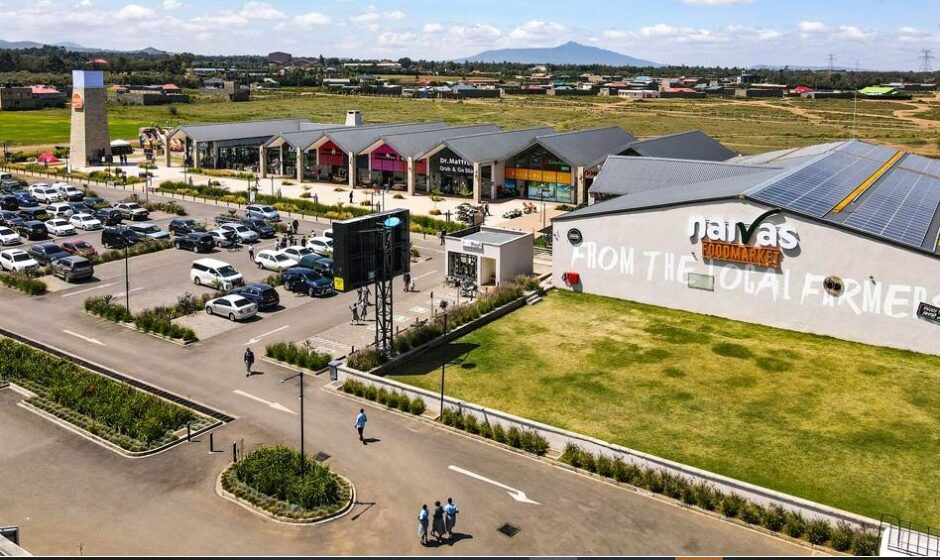Travel has evolved in so many ways, and in a country like Kenya, several companies have stepped in to make long-distance journeys more comfortable and accessible for everyone. One of the busiest and most frequently used routes is the Nakuru–Naivasha highway, which, on a typical day, sees a steady stream of vehicles making their way across the Rift Valley.
When you’re travelling, there’s a certain peace of mind that comes from knowing you’ll have a convenient stopover along the way, a place to stretch your legs, grab a bite, use a clean restroom, or just take a breather.
I recently took a road trip to Nyahururu, and we made a stopover at Delamere for lunch. Safari Centre was also an option, but our cravings led us to Delamere for their tasty bhajias and spicy tikka chicken at one of the restaurants. As we were leaving, we grabbed a few drinks for the road — it was a two-hour drive to our destination. Still, I hesitated to have more than one bottle of Savannah because I wasn’t sure whether we’d find another convenient stopover on the way.
Our next potential stop was Panari Nyahururu, where my friend planned to buy tea — at a steep KES 300 a cup — just to get access to the washroom. I couldn’t help but wonder: what happens if Panari wasn’t there? Or if someone couldn’t afford that cup of tea? What if someone had a stomach issue and needed a real emergency stop?
So, I paced myself with the drinks, knowing we still had a two-hour drive back to Delamere.
Convenient stopovers should be exactly that — convenient. Designed for every kind of traveller and every kind of need, especially on long road trips.
Enter Safari Centre. Strategically located on one of Kenya’s busiest highways, the gateway to destinations like Eldoret and Kisumu, it’s more than just a fuel station or restaurant.
When James Hoddell and his team at Dowgate Properties broke ground in December 2020, they weren’t just building another roadside facility. Their vision was to create something unprecedented on Kenya’s highways – a true “oasis” for travelers. The flagship location in Naivasha, which opened its doors in 2021, represents a new standard for what highway convenience can look like.
The architectural brilliance of Safari Centre comes courtesy of Dutch firm JDV International, whose design philosophy centered on creating interconnected spaces that feel more like a modern lifestyle center than a traditional rest stop. The result is a stunning 3,000 square meter complex that seamlessly blends functionality with aesthetic appeal.
What sets Safari Centre apart is its comprehensive approach to traveler needs. The complex houses a full-service Naivas supermarket, ensuring that whether you need groceries for the road ahead or forgot something essential at home, you’re covered. The integrated fuel station means you can fill up your tank while someone else in your group shops or grabs a meal.
For families, the thoughtfully designed children’s play area transforms what could be a stressful stop into a welcome break. Parents can relax on shaded terraces while kids burn off energy in a safe, supervised environment. The curio shops offer a chance to pick up authentic Kenyan crafts and souvenirs, while the Dr Mattress store caters to those unexpected comfort needs that arise during long journeys.
The dining options at Safari Centre deserve special mention. ArtCaffé brings its renowned coffee culture and light meals to the highway, while Pizza Inn offers familiar comfort food for families. Galitos provides flame-grilled chicken options, Creamy Inn serves up delicious ice cream treats perfect for Kenya’s warm climate, and Chicken Inn rounds out the fast-food offerings. This variety ensures that whether you want a quick snack, a proper sit-down meal, or something in between, your preferences are accommodated.
Perhaps most impressively, Safari Centre has positioned itself at the forefront of Kenya’s electric vehicle revolution. As the first facility outside Nairobi to offer EV charging points, it’s enabling the crucial Nairobi-Kisumu corridor for electric vehicle travel. This forward-thinking approach demonstrates how modern travel infrastructure can support environmental sustainability while meeting evolving transportation needs.
The facility’s “Loo4U” designer restrooms have earned particular praise from travelers. For just KES 20, visitors access impeccably clean, well-maintained facilities that rival those found in upscale hotels. It’s a small detail that makes a significant difference in the overall travel experience.
The numbers speak for themselves – Safari Centre sits at a location where approximately 100,000 vehicles pass weekly. This strategic positioning, combined with the facility’s park-like environment of interconnected terraces and garden spaces, creates a compelling reason for travelers to choose this particular stop over others along the route.
The spacious, free parking and easy highway access mean that stopping here doesn’t feel like a detour or inconvenience. Instead, it becomes a natural and pleasant part of the journey. Many travelers report that what was intended as a quick fuel stop often extends into a longer break, as the comfortable environment encourages lingering.
Delamere Farm Shop
The Delamere Farm Shop represents a different but equally compelling approach to highway hospitality, one deeply rooted in Kenya’s agricultural heritage. Operated by Delamere Farms, the facility carries the legacy of Thomas Cholmondeley, who developed this significant agricultural estate in the 1990s and became a notable figure in Kenya’s farming and conservation movements.
The transformation of the original Delamere Milk Shop into a comprehensive petrol station and rest stop in 1996 was born from practical necessity – the need to serve the growing number of travelers on the Nakuru highway. However, what emerged was something that maintained the authentic character of the farm while providing modern conveniences.
The heart of Delamere’s appeal lies in its authentic, unpretentious approach to hospitality. The full-service Rubis fuel station operates around the clock, providing not just fuel and diesel but also essential services like quick-lube, tire services, and air for tires. The convenience store stocks all the essentials you’d expect, but it’s the adjacent dining options that truly set Delamere apart. The Indian-style snack shop offers a taste of our country’s rich culinary diversity with bhajias, samosas, and spring rolls that are prepared fresh and served hot. For those seeking a more substantial meal, the nyama choma served in the relaxed dining den provides an authentic taste of Kenyan cuisine
What many travelers find most appealing about Delamere is its unpretentious charm. The spacious parking area, shaded by mature acacia trees, provides a serene environment that contrasts beautifully with the bustling highway just meters away. The Rift Valley views that frame the facility create a sense of place that connects travelers to Kenya’s stunning natural landscape.
The facility’s rustic charm doesn’t compromise its practical utility. The ample parking accommodates both cars and trucks, making it accessible to all types of travelers. The relaxed atmosphere encourages visitors to take their time, whether they’re grabbing a quick snack or settling in for a proper meal with a cold beer.
SupaStop Sultan Hamud
The story of SupaStop represents perhaps the most ambitious attempt yet to reimagine highway infrastructure in Kenya. When Superior Homes Kenya invested KES 350 million in this groundbreaking truck-stop complex in late 2024, they weren’t just building another roadside facility – they were pioneering a solution to one of Kenya’s most pressing transportation challenges.
Located in Sultan Hamud along the crucial Nairobi-Mombasa highway, SupaStop emerged from a collaboration between Superior Homes Kenya, the Northern Corridor Transit & Transport Coordination Authority, and Makueni County. This partnership reflects a growing recognition that effective highway infrastructure requires coordination between private developers and public authorities.
The need for SupaStop becomes clear when you consider the statistics: along the 145-kilometer stretch between Mtito Andei and Salama, approximately 300 trucks were parking informally overnight before this facility opened. These makeshift stops, often lacking basic amenities or security, contributed to a dangerous cycle where driver fatigue was causing 92% of accidents along this route.
SupaStop’s strategic positioning directly addresses this gap, providing a safe, well-equipped alternative to informal roadside parking. The facility’s spacious, well-monitored parking bays offer truck drivers the security they need while resting, transforming what was previously a risky necessity into a comfortable, safe experience.
What sets SupaStop apart is its holistic approach to driver welfare. The facility recognizes that long-haul truck drivers face unique challenges that go beyond basic fuel and food needs. The affordable lodging options provide drivers with proper rest facilities, acknowledging that quality sleep is essential for road safety.
The comfortable restrooms and shower facilities address basic hygiene needs that are often overlooked at traditional stops. For drivers who spend days on the road, access to clean shower facilities can significantly improve both comfort and morale. The inclusion of a health facility recognizes that drivers need access to medical care, while prayer rooms acknowledge the spiritual needs of Kenya’s diverse driving community.
The on-site fuel station provides not just diesel and petrol, but comprehensive truck services including tire maintenance and lubrication services. This integrated approach means drivers can address multiple needs in one stop, maximizing efficiency while minimizing time away from the road.
Perhaps most significantly, SupaStop represents the pilot for a planned network of 30 similar facilities across Kenya’s highway system. This network approach could transform long-distance transport in Kenya by creating predictable, reliable stopping points that drivers can count on for consistent service and safety standards.
The logistics, maintenance, and driver-training facilities at SupaStop suggest a forward-thinking approach that goes beyond immediate needs to address long-term industry development. By providing driver training, the facility contributes to overall highway safety while supporting professional development in the transport sector.
Local officials and Superior Homes describe SupaStop as a “significant upgrade” that promises to boost not just safety and driver well-being, but also local employment and economic growth in the region. This multiplier effect demonstrates how well-designed infrastructure can benefit entire communities.
MyTown Karen
MyTown Karen represents a different model of convenience – one that serves established communities while accommodating through traffic. Developed in the mid-2020s through a joint venture between Myspace Properties and AMS Properties Ltd, this facility demonstrates how suburban centers can evolve to meet diverse transportation needs.
Located in Karen, one of Nairobi’s most established neighborhoods, MyTown Karen occupies a unique position in Kenya’s convenience infrastructure. While not directly on a major highway, it serves as a hybrid lifestyle and convenience center that caters to local residents, commuters, hospital visitors, and tourists.
The retail mix at MyTown Karen reflects its multi-faceted role in the community. The supermarket and grocery shops serve daily needs for local residents, while coffee bars provide social spaces for community interaction. Banks and chemists address essential services, while fashion outlets and offices add commercial diversity to the mix.
The inclusion of a gas station makes MyTown Karen particularly valuable for commuters along Langata Road. The facility’s well-designed layout, featuring ample parking and shaded walkways, creates a tranquil suburban ambiance that encourages longer visits and multiple-purpose trips.
MyTown Karen’s location makes it an ideal stop for tourists heading to or from Langata or the Nairobi National Park. This positioning allows the facility to serve both local needs and tourism traffic, creating a sustainable business model that supports diverse revenue streams.
The facility’s design acknowledges that suburban convenience centers must balance efficiency with comfort. The shaded walkways and thoughtful layout create an environment where visitors can accomplish multiple tasks without feeling rushed, whether they’re local residents running errands or tourists stocking up before a safari adventure.
Mtito Andei
Mtito Andei occupies a unique position in Kenya’s transportation and tourism infrastructure. This town of approximately 4,760 residents sits strategically at the edge of Tsavo East National Park, roughly 233 kilometers southeast of Nairobi along the vital Nairobi-Mombasa highway.
The town’s role as a gateway to Tsavo East National Park shapes its entire identity as a service center. The presence of national park gates adjacent to the town means that Mtito Andei naturally serves as a preparation and recovery point for safari adventures, creating a specialized niche in Kenya’s tourism infrastructure.
What makes Mtito Andei particularly interesting is its integration of multiple transportation modes. The railway station connects the town to Kenya’s rail network, while the Mtito Andei Airstrip accommodates smaller charter flights serving the Tsavo region. This multi-modal approach creates opportunities for diverse travel experiences and logistics solutions.
The town’s fuel stations, restrooms, restaurants, lodges, and small shops form a comprehensive ecosystem that serves both park-bound visitors and highway travelers. This dual purpose creates a sustainable economic base that supports the local community while providing essential services to travelers.
For travelers making the long journey between Nairobi and Mombasa, the town provides a natural pause point that breaks up the drive while offering glimpses of Kenya’s wildlife heritage.
The town’s position creates a unique value proposition – it’s not just a stopping point, but a destination that enhances the overall travel experience. Visitors can fuel up, rest, and perhaps catch sight of wildlife before continuing their journeys, creating memories that extend beyond mere convenience.
From Necessity to Experience
All the stop overs mentioned above represent different approaches to the same fundamental challenge: how to make travel safer, more comfortable, and more enjoyable. Each has found its own solution based on location, target market, and community needs.
SupaStop’s focus on driver welfare and safety addresses the critical issue of highway accidents while creating economic opportunities for local communities. MyTown Karen’s suburban model demonstrates how convenience centers can serve multiple markets while maintaining community character. Mtito Andei’s tourism-transportation integration shows how natural advantages can be leveraged to create sustainable service economies. Safari Centre with its modern, comprehensive approach and Delamere with its heritage-focused, authentic hospitality – represent the evolution of Kenya’s travel infrastructure. They demonstrate that highway stops can be more than just functional necessities; they can be destinations that enhance the overall travel experience.
The planned expansion of the SupaStop model to 30 locations across Kenya’s highway system could create a standardized level of service that makes long-distance travel more predictable and safe.
Towns like Salgaa and Kikopey, which have evolved organically along the Nakuru-Eldoret and Nairobi-Nakuru corridors, tell a different story entirely. These settlements grew naturally around the needs of passing traffic, with small-scale entrepreneurs setting up informal eateries, basic lodging, and repair services wherever space allowed.
While there’s something authentically Kenyan about these grassroots commercial hubs – with their bustling roadside nyama choma joints and community-driven hospitality – the lack of coordinated planning creates significant challenges for travelers. Safety standards vary wildly, facilities can be unpredictable, and the informal nature of many services means that what you find on one visit might be completely different the next.
However, the entrepreneurial spirit of places like Salgaa and Kikopey deserves recognition. These communities have sustained countless travelers over the decades through sheer determination and local ingenuity. However, the absence of standardized amenities, proper lighting, secure parking, and reliable facilities often leaves both truck drivers and regular travelers vulnerable, particularly during nighttime stops.
SupaStop’s planned expansion represents a fundamentally different philosophy: professional, standardized service that doesn’t replace the warmth of Kenyan hospitality but rather enhances it with the reliability and safety that long-distance travel demands. It’s not about eliminating the community-driven spirit of traditional stops, but about bringing professional standards to an industry where predictability can literally be a matter of life and death.
The integration of safety, comfort, community development, and economic opportunity in these facilities suggests a future where Kenya’s highways serve not just as transportation corridors, but as networks of experiences that connect communities, support local economies, and enhance the overall quality of travel in East Africa.
The success of these stopovers has implications beyond individual businesses. They’re helping to establish Kenya as a country where long-distance travel can be comfortable, convenient, and enjoyable. For a country that depends heavily on road transport for both commerce and tourism, the development of high-quality highway infrastructure is crucial for economic growth and development.
If you’ve ever found yourself dreading a long drive – checking your fuel gauge nervously, wondering if the next rest stop will have clean facilities, or worrying about finding a decent meal along the way – then you understand why these Kenyan innovations matter so much. They represent something profound: the recognition that travel should be about more than just getting from point A to point B.
I think about the truck driver who can finally get a proper night’s sleep at SupaStop instead of catching restless hours in his cab by the roadside. I think about the family heading to Nakuru, or Kisumu, discovering that their fuel stop at Safari Centre has become an unexpected highlight of the trip – kids playing safely while parents sip quality coffee and actually enjoy the break. I think about the tourist who stumbles upon Mtito Andei and realizes that this “simple” stop has given them a genuine taste of hospitality and a preview of the wildlife adventure ahead.
These aren’t just buildings and services, they’re statements about what we value as travelers and as human beings. They say that everyone deserves clean restrooms, safe parking, good food, and a moment of comfort, regardless of whether they’re driving a family sedan or a 40-ton truck. They say that a journey can be part of the destination, not just an obstacle to endure.
The next time you’re planning a journey here, I encourage you to see these stops not as necessary evils or quick pit stops, but as opportunities to experience the country’s evolving hospitality culture. Let your children play at Safari Centre’s playground. Strike up a conversation with fellow travelers at Delamere’s dining area. Appreciate the sunset views at Mtito Andei. Take a moment to realize that someone, somewhere, thought carefully about your comfort and safety.
In a world where travel often feels impersonal and transactional, Kenya’s highway stops remind us that the journey itself can be a gift – complete with clean restrooms, good food, friendly faces, and the simple but profound recognition that every traveler deserves to be treated with dignity and care.
The road ahead looks bright indeed.



